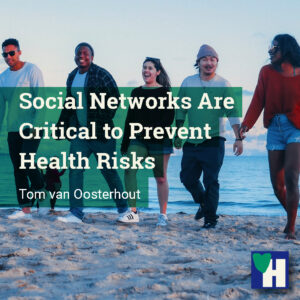
When we want to prevent health risks, we have to motivate our social circle as much as ourselves. Even when we assume to be healthy, prevention of health risks pays off. However, such prevention does not come by itself.
Prevention is a lifestyle intervention tool. For most of us, our lifestyle is the consequence of a long and repetitive social process. That’s why it’s very hard to try to change our lifestyle on our own.
As much as ourselves, we will have to motivate the social circles in which we participate. In this article, I explain why and offer some suggestions on how we can motivate our social circles to help us.
Some of the links are affiliate links. As an affiliate associate, we earn a commission when you purchase any of the products offered through the shared links at no extra cost for you. This helps us maintain this website.
Table of contents
The more support we can get to change our lifestyle from those in our social network, the more healthy we will become.
Health risks

In general, there are three health risks: a sedentary lifestyle, being overweight, and having a poor metabolism. Each of these three risks poses a serious problem. In combination, these problems will make us sick.
Physicians like it when we’re sick. Physicians are trained, like mechanics, to repair what’s wrong. And they’re often pretty good at it. However, their medical reflexes tell them to prescribe medication or to knife the wrong parts away.
They don’t prescribe our lifestyle, let alone hold our hand all day while we make an effort to change the way we live. Physicians are not part of our everyday social network. After they’re done with us, we’re out there on our own.
Change of lifestyle
However, we’re not quite on our own out there. Our family, friends and colleagues are there. But are they there to support us? Are they willing and prepared to respect and support our choice to change our lifestyle?

Will they also give up their sedentary lifestyle? Eat less? Eat better? Stop smoking? Stop drinking alcohol? Stop eating salt, sugar or non-essential fats? Stop watching TV all night? Or sit all evening behind their laptop or with their mobile in their hands? Could we ask them to change their lifestyle as well?
Most people don’t need much explaining to understand how difficult it is to gain social support, especially for such drastic changes as a change of lifestyle. We’re cast in a social and physical environment that will always try to determine whether our wishes to change will succeed.
Prevention is a lifestyle intervention tool
In general, there are three ways to handle the challenge of convincing our social circle to support us to succeed in changing our lifestyle:
- by fear mongering;
- by pointing out the pleasure of sharing the challenge;
- or by presenting the change as our personal desire in which they play a major role.
Be aware that any of the three ways can be equally effective. The problem is that we can only use one approach at a time per individual because most people have a prefered inclination to one of the three. Moreover, it’s not always clear what sensitizes individuals. And we’ve also to take into account that in social circles people exchange views and experiences.
Fear-mongering

We might try to persuade our social circles that social health risks, such as a sedentary lifestyle, being overweight, and having a poor metabolism, cause heart and vascular diseases and diabetes.
As such, these are not nice diseases, but their complications are even more fearsome: blindness, kidney failure, heart failure, open wounds, and non-healing infections.
Such diseases and their complications often come with depression and insomnia. Moreover, the pills the physicians prescribe to counter these diseases and complications, always cause side effects.
Take for instance bisphosphonates, which are supposed to cure or mitigate osteoporosis. The prescription comes with a small book to explain the side effects.
Personally, I do not prefer fear-mongering. However, many people seem to be motivated by arguments that point right at their fears.
Many people like to share challenges. With family members, with friends, and even with colleagues. Take for example the following lifestyle change.
We agree with our family members or some of our closest friends to sit at least 2 hours less every day for a week. At the end of each day, we share our experiences.
To give the challenge some spice, it’s perhaps best that all participants first write down how many hours of the day they estimate they sit during an average week: at breakfast, in the car, in public transport, at lunch, at dinner, in front of the TV or the laptop at home.
The next week they measure with their clocks how many hours they really sit down. In the third week, they try to sit 2 hours less each day (this article explains why it’s better not to sit too long and offers some suggestions on what we can do standing during these 2 hours). Yes, we’re allowed to watch TV standing up straight. We might even be able to do some simple exercises while watching TV.
The desire to tackle health risks

The third option to call for social support for our lifestyle change is to present this change as our most favourite desire. Don’t explain the background, it’s our most important and deepest personal wish. Clarify the change as an improvement, as something, which we expect us to do a lot of good.
Ask family, friends, and colleagues directly for their support. Of course, they will ask what kind of support we might favour. We don’t need to go into all the details of what caused our desire for a lifestyle change, how we plan to organize the change, and what goals we exactly aspire to achieve.
We just try to share our belief, that we need the safety of our social environment, and that we need to share this concern with them, and the hope that the challenge will pay off. For which we will be forever grateful to them. For some people to believe in us is more important than the facts.
How difficult it is to aspire to the challenge of a lifestyle change, can be explained with one very simple example. To eat out is an intricate and very important and agreeable part of social life. With the virus, this has become somewhat difficult.

This hasn’t stopped clever people from turning such disadvantages in their favour. Many restaurants and caterers started home-delivery services. We might think that during the pandemic they picked up the lesson that it’s very important for people to improve their immune system and that, as a consequence, they likewise should make their menus more healthy.
However, they keep on pouring their usual enormous amounts of sodium salt, granulated sugar, and non-essential fats into our food. These ingredients are a direct and very serious threat to any immune system, even the ones of healthy people.
How do we explain to our family and friends that we love it when they invite us for dinner, however, that we no longer care to share unhealthy food? Or that we no longer wish to drink alcohol.
To escape social pressures is probably one of the most unpleasant and likewise difficult challenges there is. Yet, to be able to change our lifestyle, we have no choice but to try.
How do you mobilize your social network for support? Please let us know in the comment box below.

Hi, these are very good questions. When you make a change in lifestyle, it is often received by resistance, depending on what change you make. When I became vegan, I received ridicule and even aggressive rebuttal within my own family. At work I was the one with the “weird diet”. Now years later, my colleagues come and ask me about healthy eating, go figure, lol.
My family has also gotten better about it, but it took them a while. My mother was the only one who was supportive about it from the beginning, she only didn’t know what to cook for me, haha, but I talked to her and showed her some easy plant-based meals, which she had already been making anyway. 😉
I think that any change is usualy disconcerting and most people don’t like change, which is why the first reaction is often resistance; but when it comes to health, some changes must be made. Otherwise you are going to experience some very unpleasant and unwanted changes in your body, like the health issues you mentioned … So lifestyle changes can only be good in the long term.
Times change indeed, Christine. It’s great that you kept approaching your colleagues in a way, that has not repelled them to ask questions now.
There is a story about an island with apes. As soon as the 100th ape took over a changed behavior, every ape on that island but also the neighboring islands would change as well.
I hope you don’t feel offended (because I mean it really positive): I consider you, Tom, me as part of that first 100 apes. By giving an example over and over eventually all the other apes will follow. 🙂
“Physicians like to prescribe medication or to knife the wrong parts away.” Haha, yes… sad but true. After all, there’s no profit to be made when people are healthy, so where is the incentive for them to heal people?
I can’t remember who said it, something like: Physicians should be paid to keep people healthy. And when their clients become sick, they should lose their pay until they are well again.
Wouldn’t that simple concept change the world of medicine and lead to a generally healthier population?
When you say it’s difficult to escape the social pressures, you’re not kidding! I remember reading an article about cancer many years ago that said the Cancer Society of America was quoting that up to 95% of cancers were due to environmental factors…. and this includes pressures to conform to our peer groups, etc. I was shocked to learn this because it means that most cancers are preventable…. and I assume this applies to many other of our ‘modern’ epidemics.
If we are serious about our health and wellbeing, we have to have the resolve to go it alone even when everything in our environment is not walking with us.
Great article. Thanks for sharing.
Hi Andrew,
Thank you for your comment and your compliments.
Physicians are like the ancient shaman. All shamans do their own trick. You have shamans who do a little dance and song. There are some who made people drink brewed herbs. Other shamans were even able to cure a headache by drilling a hole in the skull. The shamans most loved, were those who endlessly could tell stories.
But no matter what, in the end, people got sick and died. Fortunately, the shamans’ most revered stories were about our spirit, and the all-powerful gods, and the beautiful places where the gods lived, and our spirits went when we died. A perfect story to mask their own incompetence.
This has all changed. Nowadays, we have to put our confidence in scientists and other professionals. Of course, these are not as incompetent as the ancient (or present) shamans. With the exception of story-telling of course. Because when they would be good at storytelling, perhaps they might help us convince our social circles to stop harassing us when we try to change our lives for the better.
If it comes to the convincing of our social circle, this is where the challenge is greatest and where we most often stand on our own. On the other hand, who doesn’t like a serious challenge?
Stay safe and healthy.
Regards,
Tom
Firstly, the great explanation relating the social engagement and prevention of health risks really opened my eyes. But still, I’m a bit skeptical as I couldn’t resolve some points, in past and in present.
I believe, changing the lifecycle is not so easy, especially when you are habituated with this for a long time. In fact, it’s not in your control always, but you have to follow your surroundings. After all, 9:00-7:00 office hours (in my place) never allow you to perform social networking; rather this increases the health risks due to stress… critical issues like poor metabolism, heart and vascular diseases, and diabetes come step by step.
It’s true that safe and healthy social networking refreshes the soul and mind, and keeps you away from mind-related diseases, especially stress. But in this busy age how to prevent health risks that occur due to workload and stress when it’s difficult to manage time for social networking!
Hi, S Das (what an interesting name),
Your work environment is as much part of your social circle as any other place where you meet people and share behavior. Moreover, you’re always in control of your life, wherever you are. So, when you want to change your life, you can.
Who makes you stay in your office from 09:00 to 19:00 hours? That is you and nobody else. You must love your work very much, otherwise, you would have changed it already a long time ago.
My work usually starts between 06:00 and 07:00 hours in the morning and ends when I fall asleep between 22:00 and 23:00 hours at night. Every day of the week. And I love it. Always did. I watch movies, go for a walk, eat out, go shopping, prepare dinner, write, read (a lot of) scientific books and articles, listen to music. That’s all in a day’s work. I’m very happy with the small social circle I live in, and, as far as I can tell am very healthy.
You should try to see your life as your work and your work as your life. Perhaps this offers some opening to change your lifestyle for the better?
Thank you for your comment and compliment.
Stay safe and healthy.
Regards,
Tom
I love this post. My social network, unfortunately, is not supportive of my desire to change. I have embarked on a low carb lifestyle and am constantly being offered food or being told ‘just one bit won’t hurt you”. I’m also being told I’m weird. I try to get my social network to get on board with me to do Keto because we eat out a lot. But they don’t want to. What should I do
Hi Shalisha,
Thank you for your comment and compliment.
Perhaps it is, for starters, best you try to convince others that you feel very happy and confident about your choice. Next, explain to others you need them to be able to succeed with your personal goal.
Also, never forget that the restaurants you visit are part of your social circle. Explain to the staff you meet there what you want, and that you need their support also to be able to achieve your objectives. You pay them, so you might as well challenge their support.
Try these 2 options and see where you get with it. Don’t overdo your efforts by trying to change or challenge everybody at the same time in your social circle. One, or two challenges is more than enough.
Stay safe, stay healthy.
Regards,
Tom